THE BETTER PART OF VALOUR
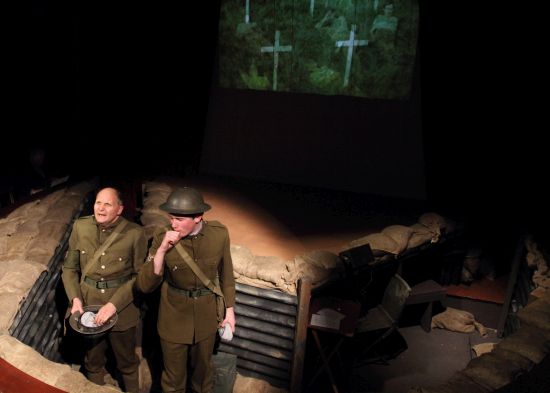 |
|
It is a singular achievement for a theatre production to command respect and admiration before the curtain even goes up. Pateley Bridge Dramatic Society, please take a very early bow.
The reason is this: the Society had the foresight, commitment and courage to commission a new play specially written to mark the centenary of the First World War. What’s more, the writer is the Society’s own hugely talented Keith Burton who already has an award-winning track record of original work. |
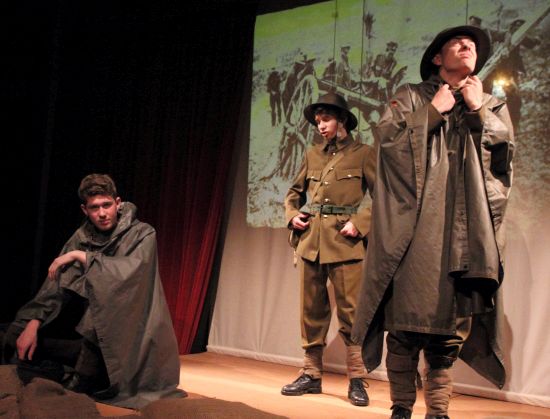 |
|
The challenge of creating a fresh look at the Great War laced with local history is a formidable one– not to mention the logistics nightmare of casting, costuming and set building. However, the result is a tour de force aptly titled The Better Part of Valour and impeccably timed to premiere on Remembrance Sunday and run through Armistice Day. For this alone, before an actor utters a line, great credit must go to PBDS for a unique tribute to the fallen. |
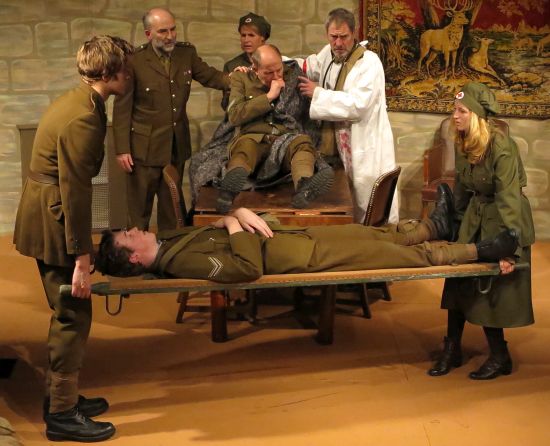 |
|
The drama pivots on the wartime role of people from the Nidderdale area - many from the Pateley Bridge Territorials - with a storyline based around two key aspects of the 1/5th Battalion’s campaign: the first ever phosgene gas attack on British troops at Ypres in 1915 and the delayed second wave attack to take Poelkappelle in advance of the assault on Passchendaele Ridge in 1917. |
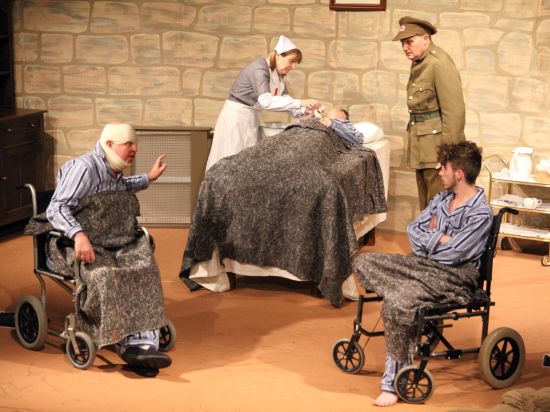 |
|
However, this carefully researched historical narrative serves as a framework for a much deeper analysis of the human condition in all its tainted glory. Certainly, it’s about the horrors of war and the crassness of the hierarchy. But Keith Burton, who also directs, has cleverly subverted a few of the usual Great War platitudes to take a closer look at the flawed nature of heroism. As a writer, he has confounded some stereotypes; as a director, he has demanded subtly calibrated performances from his actors. Without exception, young and old, they rise to the challenge magnificently. |
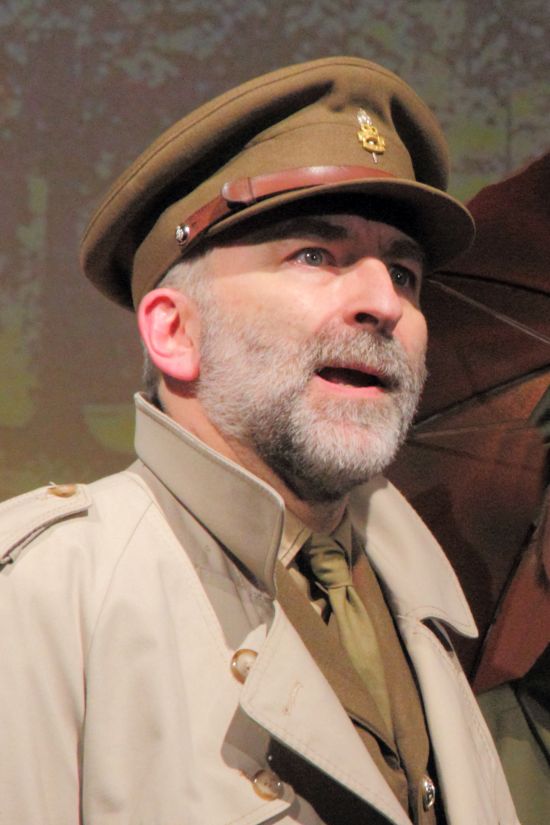 |
|
At the heart of the story is indeed a classic hero in Capt – later Major – Downey, played superbly by Steve Rouse. He perfectly embodies the traditional qualities of a born leader in the field – bravery, intelligence and compassion. His top priority is always the safety of his men but his tactical genius is thwarted by a disagreement with the top brass . In his simmering resentment, Steve neatly captures one of the inner conflicts of battle – how to maintain respect for rank while challenging authority. |
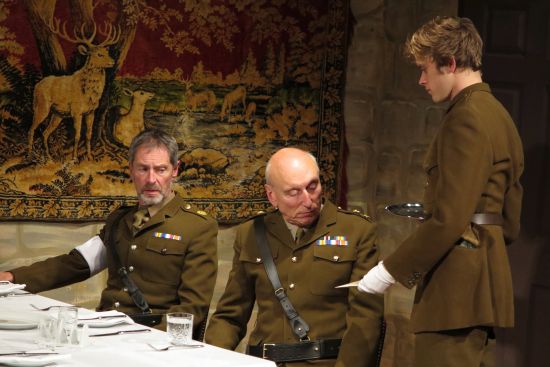 |
|
In fact, the complexities of deference are key to the scenes round the dining table with the senior officers – all portrayed with pompous panache by an impressive ensemble. At the top is Major General Paddock , the archetypal asinine commander and Capt Downey’s nemesis. Steve Hunt grips this role with self-righteous fury and hones intransigence to an art form. Keith Burton’s last-minute stand in performance as Lt Col Thompson is admirable and Michael Thorne shows a steady nobility as the dedicated doctor Major Clifford. |
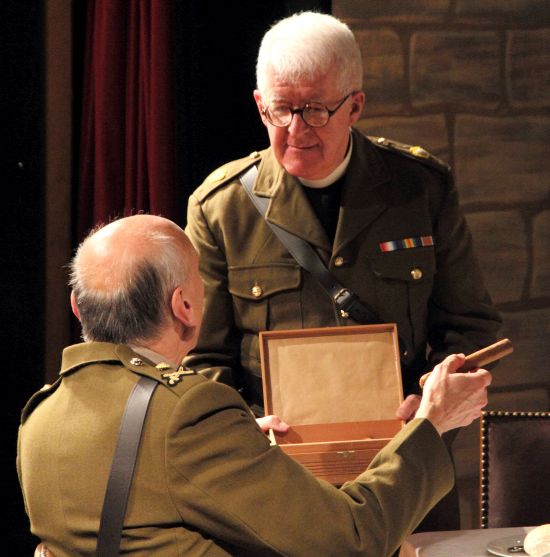 |
|
And then there’s the Padre – an excellent performance by Nevin Ward who is wonderfully grandiose and ostensibly self-centred. All is not as it seems. In the second half of the play his skill as an actor manifests itself in delicately nuanced body language, quietly hinting at the ultimate moral dilemma he confronts. |
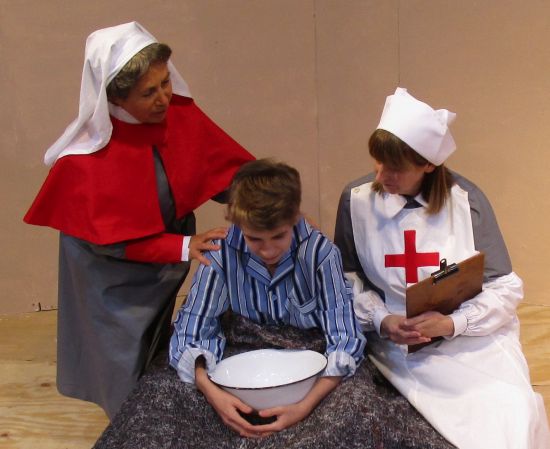 |
|
Also at the high table is the Matron, played with brisk authority by Ruth Dodsworth who reveals humanity beneath a fearsome outer shell. Joyce Liggins as Sister Dearing is equally caring, and though separated by rank, both of them deftly combine efficiency with compassion. One of the Sister's patients Private Watson is a good cameo by Playhouse veteran Iain Johnson - the epitome of the bandaged delivering the badinage. |
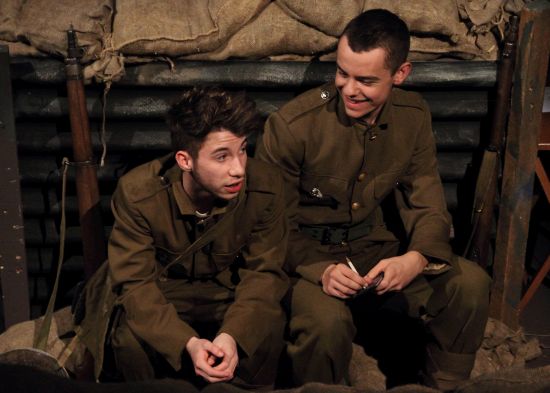 |
|
The symbolic class obsessions of the dining scenes – the finer points of cigars and vintage wine – are brilliantly intercut with the hellhole of the trenches thanks to inspired set design and superb audio visuals. Here, the Tommies come into their own with another fine ensemble performance – and what a joy it is to see so much new young talent take to the Pateley stage. |
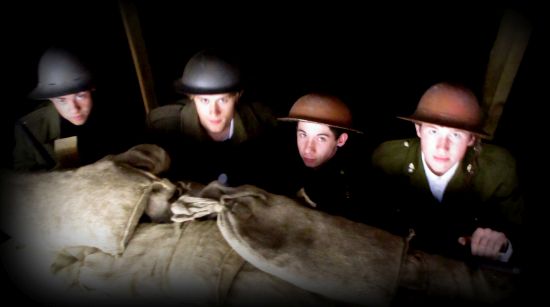 |
|
Harry Dunn, Matt Anson, Billy Skeet, and Josh Macey make their debut at the Playhouse alongside Jaxom Smith, already one of the rising young stars at Pateley. They all give the soldiers heart and soul as well as blood and guts. Their transition from naïve, chirpy optimism to the full horror of the trenches is deeply affecting, exemplified by the truly blood curdling screams of Billy Skeet’s Private Blakey - once “keen as mustard” - as he is stretchered off. Harry Dunn as Smithy embodies the loss of innocence through his diary monologue, movingly delivered as he charts the death of his mates and the slow descent to despair. |
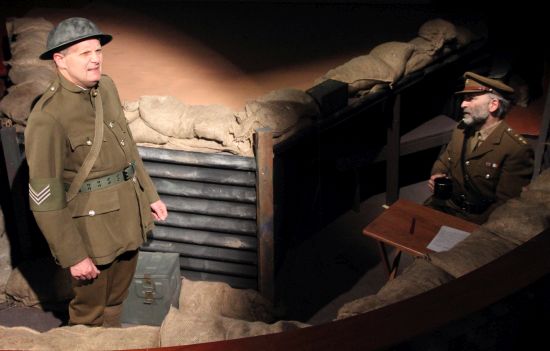 |
|
At the heart of trench life is their leader, guardian and friend Sgt Noakes. Peter Buller absolutely nails this role. He is compelling in his portrayal of doughty heroism – the bluff, no-nonsense bravery of a modest Yorkshireman with a sense of duty and genuine affinity with his men. Peter later shows his versatility with an edgy portrayal of the Sergeant’s twin brother, diametrically opposed in personality. A medical orderly accused of cowardice, he is a nervy soul – but shows tentative heart. |
.jpg) |
|
The plot also introduces a sub-theme of burgeoning romance, first between Capt. Downey and nursing auxiliary Christobel, beautifully played by Jenny MacNair who always brings a luminous quality to the stage. As the self-deprecating “bored daughter from a country estate” she is warm and funny, yet initiates some of the most poignant moments of the evening in the scenes with Downey. |
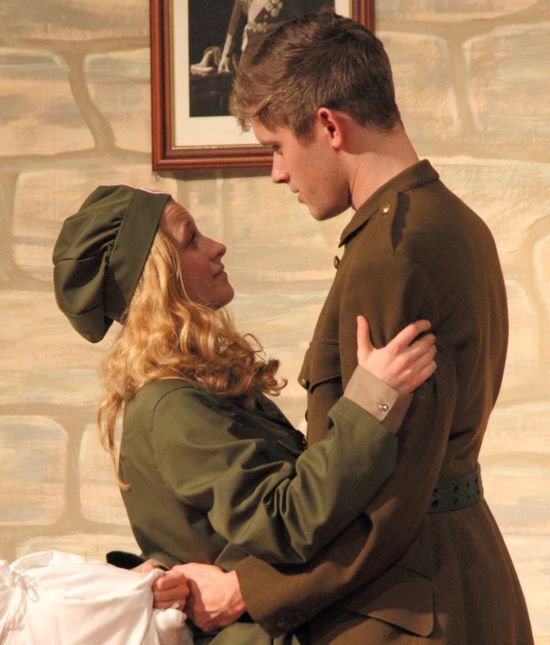 |
|
The second pairing of Private White and ambulance driver Bea produced two charming portrayals by Matt Anson and Brenna Smith, both endearingly innocent. |
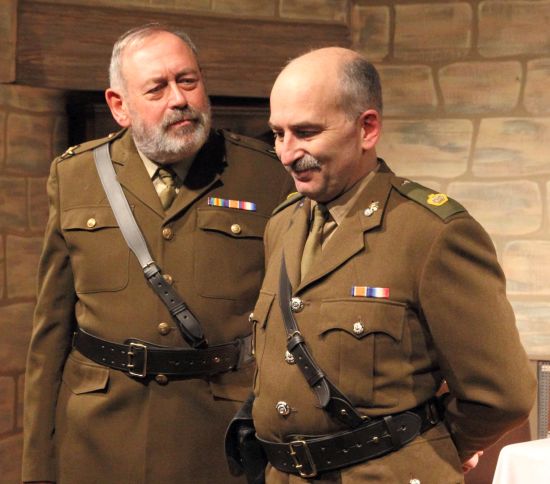 |
|
Post- interval, the play changes tone and we are introduced to the aristocratic Brigadier General Chisholm, a towering, glowering performance by Jerry Harvey in cracking form. He is splendidly bombastic – but again has the skill to turn this characterisation on its head as the surprise voice of decency, common sense and brave good judgement. |
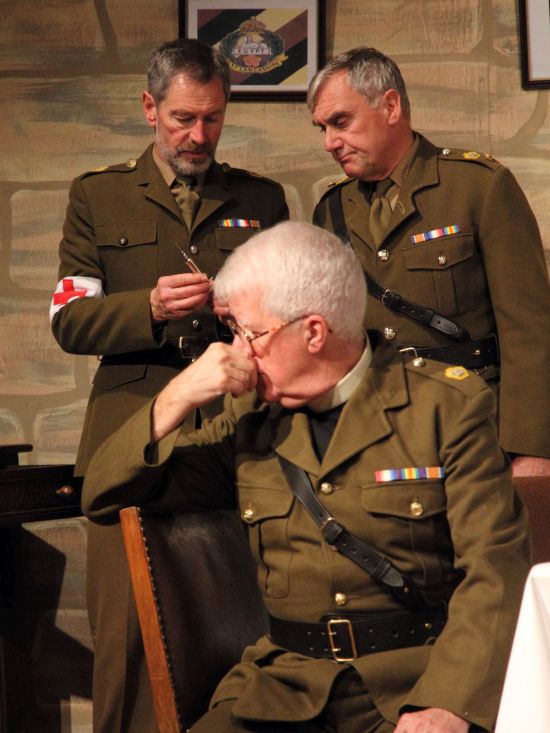 |
|
The final scenes play out in whodunit mode, with a gripping denouement and a cleverly apposite Shakespearian script flourish to declare discretion to be the better part of valour. You could have heard a pin drop. |
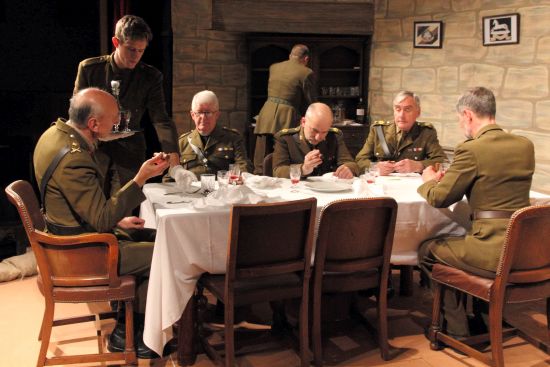 |
|
Lastly, and as befits the spirit of the play, a word of praise for the unsung heroes of the night– the backstage team. Hats off to Christine Ward and Debbie Forsyth, wardrobe and props respectively, who faced a mammoth challenge - not just in scale but in the requirement for historical accuracy. Their attention to detail was meticulous. The technical and stage crews led by Sue Hickson and Alan Stewart were, as always, at the top of their game. |
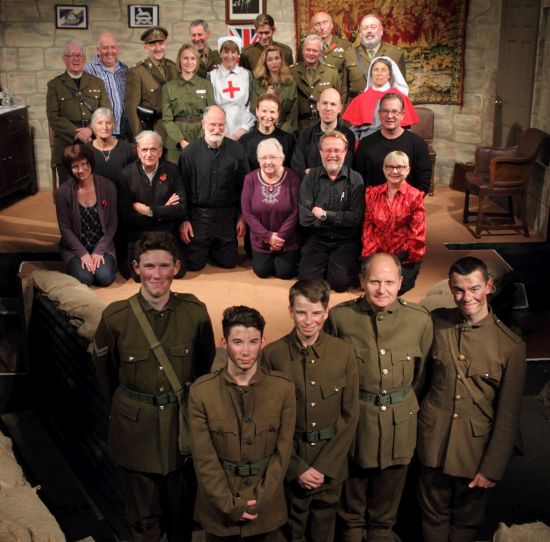 |
|
Congratulations to all – this was a powerful, intelligent and moving work of commemoration which will always stand proud as Pateley Bridge Dramatic Society’s own Act of Remembrance.
Review by Cheryl Barber
Photographs by Chris Iredale |